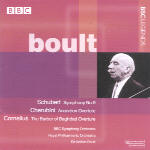Is anyone pining for Boult’s Schubert Ninth? He recorded the work several times commercially, versions that at no point challenged the best of the competition, and this live effort, while broadly similar to those dull ones, differs from them only to the extent that it’s worse. Far worse. Let’s put aside for the moment a Royal Albert Hall audience whose coughing and rustling regularly drowns out the music’s quieter passages, particularly the beginnings of the first two movements. There’s nothing more fundamentally vulgar or inartistic than a performance that consists of vast stretches of tedium relieved on occasion by feeble attempts to generate excitement through crudely violent outbursts from brass and timpani, often combined with big ritards or other attention-getting devices. That’s what we have here, and the result has all the appeal of someone telling fart jokes at a funeral.
Now for the facts: Boult begins the first movement introduction at a crawl, rhythms totally slack, then makes a violent and unconvincing accelerando into the allegro. What little energy this creates immediately begins to dissipate, thanks to the conductor’s diminuendo treatment of the principal theme’s first phrases, and evaporates entirely when he slams on the brakes for the second subject. This dual tempo approach plays havoc with the development section, wherein the two themes alternate and combine, forcing Boult to stick with the slower tempo for the most part. The end of the recapitulation and coda contains several instances of the sort of crass point-making mentioned above, with the return of the introduction’s main horn theme sadistically mauled. As a conception, this is one of the most ineffective renditions of this movement you will ever hear.
The Andante suffers from the appallingly whiny tone of the principal oboe and from Boult’s perverse refusal to relax the tempo even slightly for the gorgeous second subject, which he approaches with a lack of fantasy and expressiveness (particularly in the transitions) that simply beggars belief. The big climax is very loud. The scherzo, with too many of its repeats intact, turns out to be the longest movement of the symphony, and needs far better balances between winds and strings than it gets here, though the playing as such belies Boult’s reputation for tolerating ensemble indiscipline. On the whole the finale probably comes off best, certainly up to tempo, with admirable lightness from the strings in their triplet accompaniment to the second subject. Unfortunately, the end of the recapitulation contains the most horrible example of all of those tasteless blasts of brass and drums that blight the performance, while the coda itself lacks textural clarity (where are the trumpets when Schubert actually needs them?).
Boult plays the two overtures in workmanlike fashion–no more, no less–and the sound in Anacreon, from Royal Festival Hall in 1963, markedly improves on the cavernous, distantly miked, bodiless impression made by the symphony in 1969. The Cornelius dates from a decently preserved mono 1954 studio broadcast. I suppose you could argue that the quality of playing in the symphony is a remarkable accomplishment for a man of 80, and there’s no doubt the BBC band gives Boult exactly what he wants. It’s more than he deserves. If you’re looking for octogenarian Schubert, there’s always Toscanini and Wand, both superb.
































